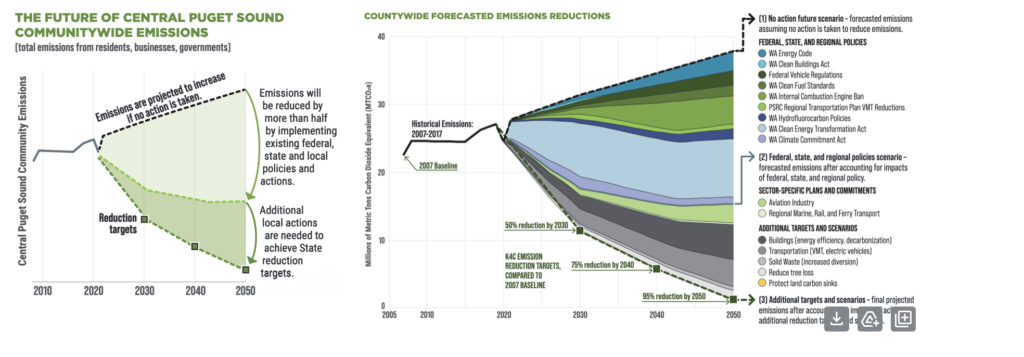Things have been moving fast! Here’s the latest from our neck of the woods.
Seattle
City Council appointed Tanya Woo to fill Theresa Mosqueda’s at large position on the City Council. Tanya Woo will chair the Committee on Sustainability, City Light, and Culture, which is a key committee for those interested in climate. Here’s a summary from her on her priorities for Seattle; she doesn’t say much about climate directly, but is in favor of increased traffic safety and more public transit service.
King County
The County released a 2023 Biennial update to the Strategic Climate Action Plan. It notes: “The most recent GHG inventory for King County showed that emissions increased to 27.1 million metric tons of CO2 equivalent (MTCO2e) by 11 percent compared to 2007. Per-capita GHG emissions have declined over time 7 percent and 23 percent in 2019 and 2020, respectively, compared to the 2007 baseline year. The most substantial drivers for an increase in emissions were population growth, higher GHG emissions from electricity provided by Puget Sound Energy, and increased aviation emissions. Increased efficiency of passenger vehicles (decreased emissions per mile) was the largest contributor to decreasing emissions.” The report also has a useful graphic illustrating the need for further local action on climate, and another one that shows how much reductions result from each policy. The grey & black areas represent changes we still need to make, and the light green are reductions we will need from aviation & marine transport.

State |
The Legislative Session is in full swing, since it’s a short session, time is going by quickly. The first deadline for bills to pass their policy committee in the Chamber of Origin (either House or Senate) is coming up next week, Jan 31. Bills that haven’t gotten the approval of their policy committee by then will be “dead” for this year, although they can be reintroduced in the next year. Here’s a quick recap of some (but certainly not all!) of the climate-related bills:
HB 1589 passed the House, and moves on to the Senate. This is the Gas Utility Decarbonization bill that would ensure that Puget Sound Energy plans for the transition to clean energy, makes significant new programs available to help folks transition off of fossil gas, and creates opportunities for low-income customers to access the clean energy transition.
Two other buildings-related bills are in the House Rules Committee, the last step before a floor vote. They are the Heat Pump Portal, which would provide a website for helping connect homewoners to rebates for electrification and efficiency improvements, and the Home Energy Score, which would inform potential house buyers how efficient potential homes are, and thus also give more of an incentive to current homeowners to make energy efficiency improvements. Buy Clean and Buy Fair, which addresses embodied carbon in state-funded projects, is also in House Rules. And Sightline’s bill to make it possible for utilities to provide ground-source heat pumps (SB 6039) has moved to the Senate Ways & Means Committee.
The ReWRAP Act (HB 2049) and the Bottle Bill have advanced to the fiscal committee. The ReWRAP Act would expand recycling access across the state, reduce recycling confusion by creating one list of what can and can’t be recycled across the state, and improve recycling outcomes by making companies that make decisions about packaging financially responsible for the end of life costs of those materials. The bottle bill would create a beverage container recycling program similar to Oregon’s.
Thanks to Robin Briggs for providing this information to SSCAN.

